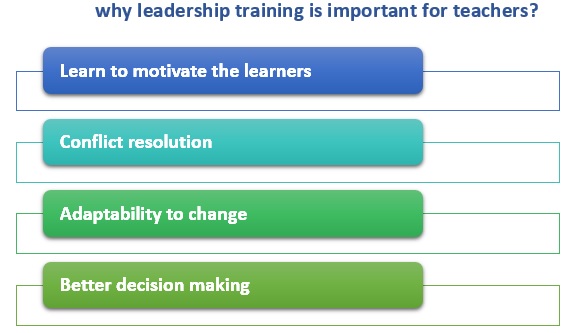Leadership is a vast and fairly complex concept that cannot really be defined through the means of a few words. Nevertheless, typically, leadership is perceived as the act of guiding others towards the achievement of a common and strong vision. Importantly, successful leaders hold a strong and focused vision that is highly relevant for the followers too. If the followers do not believe the vision, then they will not be motivated to work towards it. Recently, there has been a surge in the demand for leadership courses for teachers as educational bodies have started recognising teaching as a powerful form of leadership, and thus, teachers need to be successful leaders in order to facilitate effective learning in their respective classrooms. Let us take a look at some of the main reasons why leadership training is important for teachers.

- Learn to motivate the learners: Leadership is a lot about motivating the students and keeping them engaged. It is worth noting that students, especially young ones are less likely to pay attention or love their learning process if they are not adequately motivated. That said, leadership training can enable teachers to learn how to motivate their students. Generally, students can be motivated by designing interesting lesson plans with multiple hands-on activities, quizzes, storytelling, role plays, and other activities that can keep the learners engaged. As well as these, the teacher-leaders should learn to form interpersonal relationships with their students, listen to their problems, and build a healthy degree of trust. Consequently, the students will be motivated to listen to the teacher, pay attention, and therefore benefit from the learning process.
- Conflict resolution: Just like other leadership roles, teachers also often come across conflicts and arguments between their students. Such issues can affect the students, and also distract them from focusing on the lesson. In fact, some conflicts can escalate and lead to severe issues such as bullying. Keeping these in mind, leadership courses for teachers can equip the teachers with the ability to resolve conflicts by patiently listening to each one of the involved parties and looking for unbiased solutions that suits everyone. Since teachers deal with young students, conflict resolution is an extremely important leadership skill as young students cannot necessarily handle their arguments on their own, and hence intervention is always necessary.
- Adaptability to change: Successful leaders are those who can flexibly and firmly handle change without resisting it. Teaching is one such role wherein change is common. As new teaching methods, syllabus material and topics, technology, and learning preferences materialise, teachers always need to be prepared and resilient with regards to coming to terms with these changes. If teachers are unable to embrace the changes, then they will fail to be progressive, and their learners will be disturbed in the process.
- Better decision making: Similar to a typical leadership role, teaching requires plenty of decision making. These decisions can range from choosing which topic to teach, to how a particularly complex concept can be explained. As it happens, these are fairly important decisions as not taking the correct decision can affect the teaching quality. Sometimes, even spontaneous decisions have to be taken within a small span of time. Therefore, developing proper decision-making skills by learning how to weigh the costs and benefits of each alternative is of prime importance.
The aforementioned points explicate some of the major reasons why leadership training is important for teachers. However, leadership skills are more thoroughly explained in the leadership courses for teachers, and they play a pivotal role in helping teachers build and nurture their leadership skills for benefits in the long run.









